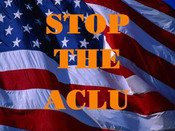The Constitution of the United States
Hmmm, it's not in there. Well, lets look at the Amendments.
Amendments to the Constitution of the United States
Article [I.]
Congress shall make no law respecting an establishment of religion, or prohibiting the free exercise thereof; or abridging the freedom of speech, or of the press; or the right of the people peaceably to assemble, and to petition the Government for a redress of grievances.How did we get from making "no law respecting an establishment of religion, or prohibiting the free exercise thereof" to eliminating any expression of Christianity from public life? There is nothing here about "a wall of separation between Church and State. Separation of Church and State does NOT come from the Constitution or any of its Amendments. It comes from a decision of the Supreme Court quoting some words of Thomas Jefferson.
Everson v. Board of Education
The "wall of separation of Church and State" is written into Justice Hugo Black's opinion.
The 'establishment of religion' clause of the First Amendment means at least this: Neither a state nor the Federal Government can set up a church. Neither can pass laws which aid one religion, aid all religions, or prefer one religion over another. Neither can force nor influence a person to go to or to remain away from church against his will or force him to profess a belief or disbelief in any religion. No person can be punished for entertain- [330 U.S. 1, 16] ing or professing religious beliefs or disbeliefs, for church attendance or non-attendance. No tax in any amount, large or small, can be levied to support any religious activities or institutions, whatever they may be called, or whatever from they may adopt to teach or practice religion. Neither a state nor the Federal Government can, openly or secretly, participate in the affairs of any religious organizations or groups and vice versa. In the words of Jefferson, the clause against establishment of religion by law was intended to erect 'a wall of separation between Church and State.' Reynolds v. United States, supra, 98 U.S. at page 164.So, the Court was able to allow reimbursement for travel on public transportation to students going to Catholic schools even with a wall of separation between Church and State.
The words of Jefferson that are refered to in the above citation are;
Mr. Jefferson afterwards, in reply to an address to him by a committee of the Danbury Baptist Association (8 id. 113), took occasion to say: 'Believing with you that religion is a matter which lies solely between man and his God; that he owes account to none other for his faith or his worship; that the legislative powers of the government reach actions only, and not opinions,-I contemplate with sovereign reverence that act of the whole American people which declared that their legislature should 'make no law respecting an establishment of religion or prohibiting the free exercise thereof,' thus building a wall of separation between church and State. Adhering to this expression of the supreme will of the nation in behalf of the rights of conscience, I shall see with sincere satisfaction the progress of those sentiments which tend to restore man to all his natural rights, convinced he has no natural right in opposition to his social duties.'Clearly Jefferson's ideas about the rights vs responsibilities of people are considerably different from what are held by modern American (secular) liberals.
Jen Shroder at The Rant.us has a few things to say, Supreme Court Grounds for a Lawsuit
The WALL works both ways. "Philosophy" classes openly attacking matters of religion and establishing humanist pluralism must adhere to the Constitution, written to preserve religious freedom!UPDATE:
I have added a link for the Reynolds vs United States citation above.






No comments:
Post a Comment